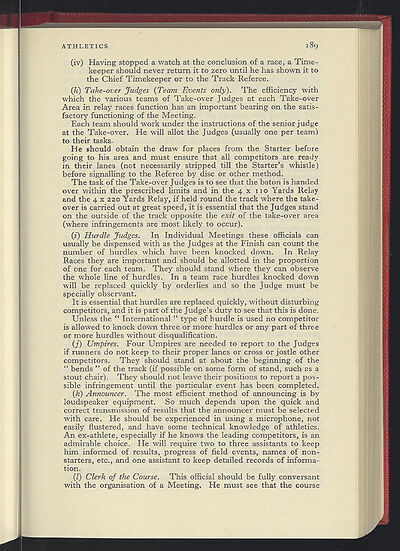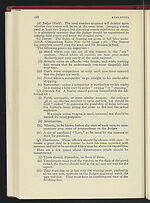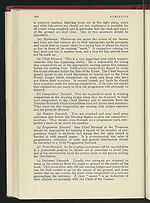1959-60
(247)
Download files
Complete book:
Individual page:
Thumbnail gallery: Grid view | List view

ATHLETICS
189
(iv) Having stopped a watch at the conclusion of a race, a Time-
keeper should never return it to zero until he has shown it to
the Chief Timekeeper or to the Track Referee.
(h) Take-over 3'udges (Team Events only).
The efficiency with
which the various teams of Take-over Judges at each Take-over
Area in relay races function has an important bearing on the satis-
factory functioning of the Meeting.
Each team should work under the instructions of the senior judge
at the Take-over. He will allot the Judges (usually one per team)
to their tasks.
He should obtain the draw for places from the Starter before
going to his area and must ensure that all competitors are ready
in their lanes (not necessarily stripped till the Starter's whistle)
before signalling to the Referee by disc or other method.
The task of the Take-over Judges is to see that the baton is handed
over within the prescribed limits and in the 4 x r io Yards Relay
and the 4 x
220
Yards Relay, if held round the track where the take-
over is carried out at great speed, it is essential that the judges stand
on the outside of the track opposite the
exit
of the take-over area
(where infringements are most likely to occur).
(i)
Hurdle ,judges.
In Individual Meetings these officials can
usually be dispensed with as the judges at the Finish can count the
number of hurdles which have been knocked down. In Relay
Races they are important and should be allotted in the proportion
of one for each team. They should stand where they can observe
the whole line of hurdles. In a team race hurdles knocked down
will be replaced quickly by orderlies and so the Judge must be
specially observant.
It is essential that hurdles are replaced quickly, without disturbing
competitors, and it is part of the judge's duty to see that this is done.
Unless the " International " type of hurdle is used no competitor
is allowed to knock down three or more hurdles or any part of three
or more hurdles without disqualification.
(j) Umpires.
Four Umpires are needed to report to the Judges
if runners do not keep to their proper lanes or cross or jostle other
competitors. They should stand at about the beginning of the
" bends " of the track (if possible on some form of stand, such as a
stout chair). They should not leave their positions to report a pos-
sible infringement until the particular event has been completed.
(k) Announcer.
The most efficient method of announcing is by
loudspeaker equipment. So much depends upon the quick and
correct transmission of results that the announcer must be selected
with care. He should be experienced in using a microphone, not
easily flustered, and have some technical knowledge of athletics.
An ex-athlete, especially if he knows the leading competitors, is an
admirable choice. He will require two to three assistants to keep
him informed of results, progress of field events, names of non-
starters, etc., and one assistant to keep detailed records of informa-
tion.
(1)
Clerk of the Course.
This official should be fully conversant
with the organisation of a Meeting. He must see that the course
189
(iv) Having stopped a watch at the conclusion of a race, a Time-
keeper should never return it to zero until he has shown it to
the Chief Timekeeper or to the Track Referee.
(h) Take-over 3'udges (Team Events only).
The efficiency with
which the various teams of Take-over Judges at each Take-over
Area in relay races function has an important bearing on the satis-
factory functioning of the Meeting.
Each team should work under the instructions of the senior judge
at the Take-over. He will allot the Judges (usually one per team)
to their tasks.
He should obtain the draw for places from the Starter before
going to his area and must ensure that all competitors are ready
in their lanes (not necessarily stripped till the Starter's whistle)
before signalling to the Referee by disc or other method.
The task of the Take-over Judges is to see that the baton is handed
over within the prescribed limits and in the 4 x r io Yards Relay
and the 4 x
220
Yards Relay, if held round the track where the take-
over is carried out at great speed, it is essential that the judges stand
on the outside of the track opposite the
exit
of the take-over area
(where infringements are most likely to occur).
(i)
Hurdle ,judges.
In Individual Meetings these officials can
usually be dispensed with as the judges at the Finish can count the
number of hurdles which have been knocked down. In Relay
Races they are important and should be allotted in the proportion
of one for each team. They should stand where they can observe
the whole line of hurdles. In a team race hurdles knocked down
will be replaced quickly by orderlies and so the Judge must be
specially observant.
It is essential that hurdles are replaced quickly, without disturbing
competitors, and it is part of the judge's duty to see that this is done.
Unless the " International " type of hurdle is used no competitor
is allowed to knock down three or more hurdles or any part of three
or more hurdles without disqualification.
(j) Umpires.
Four Umpires are needed to report to the Judges
if runners do not keep to their proper lanes or cross or jostle other
competitors. They should stand at about the beginning of the
" bends " of the track (if possible on some form of stand, such as a
stout chair). They should not leave their positions to report a pos-
sible infringement until the particular event has been completed.
(k) Announcer.
The most efficient method of announcing is by
loudspeaker equipment. So much depends upon the quick and
correct transmission of results that the announcer must be selected
with care. He should be experienced in using a microphone, not
easily flustered, and have some technical knowledge of athletics.
An ex-athlete, especially if he knows the leading competitors, is an
admirable choice. He will require two to three assistants to keep
him informed of results, progress of field events, names of non-
starters, etc., and one assistant to keep detailed records of informa-
tion.
(1)
Clerk of the Course.
This official should be fully conversant
with the organisation of a Meeting. He must see that the course
Set display mode to:
![]() Universal Viewer |
Universal Viewer | ![]() Mirador |
Large image | Transcription
Mirador |
Large image | Transcription
| Games and sports in the army > 1959-60 > (247) |
|---|
| Permanent URL | https://digital.nls.uk/248866249 |
|---|
| Description | 'Games and Sports in the Army' was an annual publication produced by the British War Office between the 1930s and 1960s. This included the Second World War. It outlines the rules and regulations for games and sports played by members of the armed forces. It features names and photographs of team members, and examples of contemporary advertising. |
|---|---|
| Shelfmark | GWB.52 |

